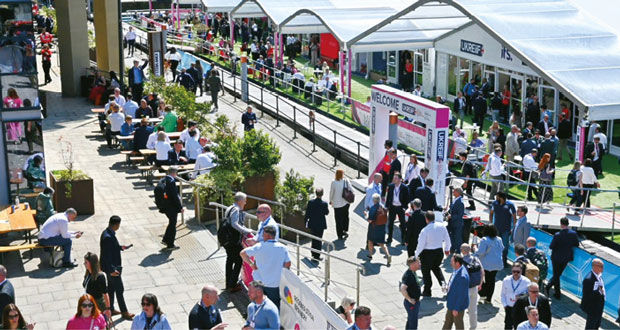 UKREiiF, which took place in Leeds on 20-22 May, focused on how the real estate industry can drive innovation and shape a sustainable future for the next generation. Madeleine Ford offers a summary of the event
UKREiiF, which took place in Leeds on 20-22 May, focused on how the real estate industry can drive innovation and shape a sustainable future for the next generation. Madeleine Ford offers a summary of the event
UKREiiF, the UK’s Real Estate Investment and Infrastructure Forum is the largest event in the UK’s real estate, property and infrastructure calendar, and this year welcomed around 16,000 attendees across the three-day period including 150+ exhibitors and 1,250+ speakers. Its aim is to drive sustainable, inclusive and transformative investment and regeneration in the regions.
TECH & SUSTAINABILITY
The future of real estate in terms of sustainability and net zero was a stand-out theme across the event, particularly the topic of implementing the right technology for a sustainable future.
In a panel session chaired by Tilly Shaw, Associate Director for Real Estate at Verco, the discussion focused on leveraging AI to accelerate net zero delivery. The real estate sector is always needing to look into the future perhaps a bit more than other industries, Shaw stated at the beginning of the discussion. As of now, that future is a bit alarming considering the climate challenges and geopolitical instability our planet is facing. On top of this we are facing a new digital era, with Artificial Intelligence changing the way we live, work and interact. This poses a couple of challenges for the real estate industry according to Shaw; firstly, bringing the global real estate portfolio down to net zero in a safe way, and secondly creating future proof spaces that are resilient, remain relevant, and retain their value as the world continues to change.
Deploying digital and AI technology can help accelerate us toward net zero, with a recent report suggesting that global carbon emissions could be reduced by four per cent by 2030 if we use AI and digital tools correctly. The idea that this is not something the sector can afford to ignore was a prevailing message of this year’s event.
Brett Omrod, Net Zero Carbon Lead at LaSalle Investment Management, spoke about how 15-30 per cent of savings were made by simply making sure existing systems in the buildings were running efficiently and by implementing an AI overlay over their building management systems, referred to as BMS AI. In the first year they were able to save 13 per cent on energy savings and seven per cent on gas, totalling around £75,000.
Also on the topic of AI, importance was placed on the quality of the data, with Lea Vavrik, Head of ESG at Newmark remarking that AI is only as good as the data and information it is given, it also needs the right pool of information to work effectively.
CHALLENGES
Real estate has some of the most complicated stake holder maps, and it was clear across many of the talks at the event that the biggest challenge faced by organisations wishing to implement new technologies is getting them approved at every level. Most of the technology we need to accelerate us toward net zero is already there, but the biggest issue is people management. AI technology was perfectly described by Pal Hauff Hvattum, CEO and Co-Founder of CQuel, as “a superhuman machine that will allow us to use our time more wisely just as long as we allow it to and use it correctly”.
Interestingly Omrod noted that, once implemented, it was the facilities management team that embraced the tech the most, as it allowed them to be more proactive as opposed to reactive and subsequently the number of issues they had to respond to decreased drastically.
INDUSTRY ALIGNMENT
Positively, sustainability and ESG were more embedded in conversations at UKREiiF this year than ever. However, it was remarked in a panel titled, ‘Sustainability in Focus: Innovation for a Greener Future’, that the industry requires less conversation and more action.
It is about embedding a long-term mindset with sustainability in mind and making sure industry leaders are aligned in their actions- “there is no point trying to anticipate issues that may arise if we’re not working to solve the ones that are already being commonly experienced across the industry,” Matt Webster Head of Sustainability at British Land remarked. He emphasised it is about communication and transparency with one another on what these problems are.
The prevailing message from UKREiiF 2025 was how the real estate sector can achieve a sustainable and promising future through utilising AI and technology, and by using the right data in the right way. But this will only be effective if leaders commit to industry-wide collaboration, transparency and to making constructive decisions. Most of the tools needed to make a difference are already there, collective change and embedding a long-term mindset is the difficult part; a combined shift of less conversation to more action in the real estate industry is the answer.






